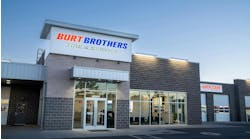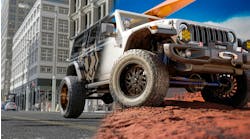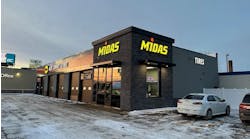John Bemis, lead technician at VIP Tires & Service’s store in Bangor, Maine, earlier this year was recognized as a World Class Technician by the National Institute of Automotive Service Excellence (ASE). And in November, he was named the AAPEX Technician of the Year.
The World Class Technician recognition started around 35 years ago and has been given to almost 2,000 technicians. Fewer than 50 technicians receive the honor annually.
Bemis, the seventh VIP Tires employee to achieve World Class status, shares insights on best practices for tire technicians, emphasizing the importance of learning from experienced colleagues, effective communication and handling mistakes constructively.
With nearly 12 years in the industry, Bemis provides these tips:
1.Pay attention to the experienced technicians around you. “The best practices are paying attention and learning - and learning comes from watching the guys that have been doing this for over 15 years,” says Bemis.
“I did a two-year program for (technician training) and I got a degree in automotive, but I learned more in the first year in the field than I did in those two years at school.
“If you’re in a tire shop that does mechanical work like we are and you’re a tire guy that’s doing tires and the changes, if you have downtime, pay attention to what the guys who have been here for forever are doing. That's how you’re going to learn.”
Older technicians should take it upon themselves to talk with younger technicians and teach them, too, says Bemis, who always tries to pull over younger technicians to watch him work on a certain problem.
This brings Bemis to his second-best practice: communication.
2. Communicate effectively with everyone at your dealership. “Whether it’s between the technician and the counter person, the technician and the customer or a technician with another technician, without a good level of communication it makes everyone's jobs harder,” says Bemis.
Effective communication limits mistakes and confusion and helps the dealership run more smoothly overall, he adds.
Communication between technincians is particularly important.
Bemis says technicians sharing with one another what they worked on during the day and how they solved certain problems provides a great learning opportunity for others who will encounter similar problems later.
“I want them to encounter a problem and remember talking about it or watching a technician work on it 10 years ago at VIP Tires and using what they learned here to solve the problem,” he explains.
3. You’re going to make mistakes. Get over it. The final best practice Bemis shares is how to handle mistakes. “This is going to sound very blunt, but when you make a mistake, the best thing to do is to get over it,” he says.
“When you’re new, you’re going to make mistakes. It’s the nature of the job to learn as you go. Move past the mistake and realize you are human. Now you know what not to do.
“We’ve all done it. I’ve had a wrench slip and break something unrelated to the job I’m doing and I’m like, ‘OK, looks like we are fixing that for free.’ It is what it is.
“If people read this and are new to the industry, my advice is to just keep plugging away," he says. "You’re going to make mistakes (and) you’re going to have hard issues and hard diagnoses. If this is what you want to do, it’s not going to be easy, but it’s going to be worth it."
VIP Tires & Service is the 20th largest independent tire dealership in the United States, according to MTD data.




